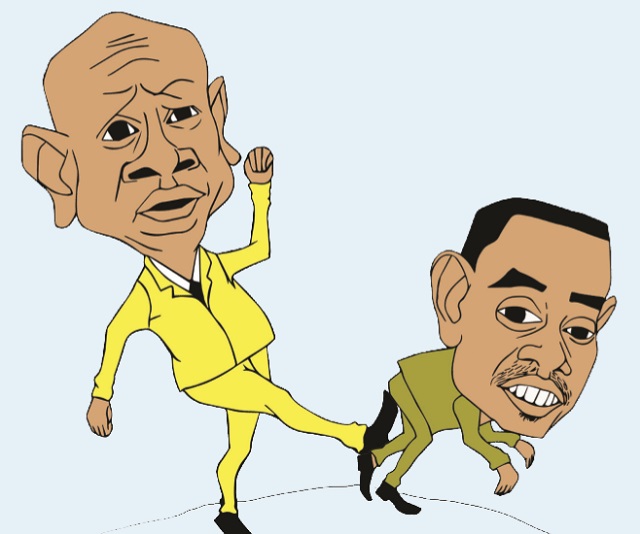
Four days later, Atooke wrote to Isabalija noting that the Attorney General after reviewing the consequences of the termination would cause in terms of compensation for the expenses incurred by CIADC on the project under the MOU, had directed him to write “to you and inform you that a date for a meeting be agreed on next week, to avert the damages government would be exposed to.”
As per the MoU, the investor needed to be qualified by the Electricity Regulatory Authority. But When Isabalija was contacted by ERA, he did not respond. The investor wrote to Energy Minister, Muloni complaining. Acting on behalf Muloni, D’Ujang, cleared the investor to get approval from ERA.
Weeks later, ERA in disregard of Isabalija’s termination of the MOU, granted CIADC a permit to conduct the feasibility studies for the project. The fight exposed how the top officials at the ministry were working at cross purpose and in the end, most of them appeared to blame Isabalija.
On his part, Isabalija defended his move insisting that that the investor had not delivered on the MoU. “The era of speculators in the energy sector is over,” he said.
In another fight, he had taken on and almost all officials at the Energy Ministry over the US$4 billion oil refinery deal. Isabalija and a few others were backing an American consortium against the Chinese. Muloni’s camp favoured the deal to go to China’s Dongsong Energy, which incidentally also has over the years enjoyed Museveni’s backing.
Initially Isabalija’s team appeared to have lost the fight as the Chinese consortium ticked all the boxes during a due-diligence process overseen by an inter-ministerial team of 40 experts. But the Dongsong consortium stumbled when a major cog dropped out in a power fight with Dongspong.
Sensing a chink is Dongsong armour, Isabalija on Aug.7 moved to finish it off with an announcement that the government had picked the American consortium for exclusive negotiations.
Almost immediately, the Chinese camp complained about the move and threated to challenge it in what industry experts said could spark of an intense procurement dispute likely to delay what is seen as Uganda’s biggest infrastructural project.
Unfortunately for Isabalija, this was the second time a potential investor was raising concerns about his alleged arbitrariness. The ministry and other agencies were still reeling from a fight over the $ 700 million Kiba Hydro Power Project.
Ganging up on Isabalija
That most of the officials involved in these fight had over the years formed a network of the most influential players in government did not help newcomer Isabalija. Early this year, the powerful Secretary to the Treasury, Keith Muhakanizi, in an interview with this reporter said he had immense respect for Kabagambe and described him as “a very smart and hardworking official”.
At the time, Muhakanizi and Isabalija were involved in an intense cold
war. Muhakanizi accused Isabalija of reporting him at State House for fighting him. Isabalija on the other hand also accused Muhakanizi of fighting him.
The fight between the two officials had been sparked by the appointment of Isabalija’s successor. Muhakanizi wanted the job to go to Frank Katusiime and Isabalija favoured Eng. Proscovia Njuki, a former fellow board member. In the end, Isabalija’s camp won and Njuki was appointed the power generator’s board chairperson. But the fight had escalated and sucked in UEGCL. Muhakanizi, who had received a dossier from a whistle blower detailing excesses at UEGCL under Isabalija’s leadership launched an investigation by auditors at his office to look into these allegations. The auditors were not successful and one of them told this reporter that the power generator blocked it.
The bad blood between the two officials would later escalate into another fight at the Rural Electrification Agency. Both Muhakanizi and Isabalija are board members there. Sources intimated to The Independent that Muhakanizi had severally opposed some of the directives of Isabalija at the agency.
In the end, Isabalija found himself alone and exposed. He was accused of lacking practical management skills, which is ironical given that he is a management expert. With a Masters of Business Administration from Makerere University and a PhD in management in Public Policy from Southern University in New Orleans, United States, Isabalija made his bones teaching management at top universities and institutes in Uganda.
Critics felt that knowing his handicap—limited knowledge about the inner workings of the sector and Uganda’s civil service—Isabalija needed to first learn, establish critical alliances before embarking on his reforms. Sector observers say Isabalija’s firing marks a triumph of the status quo at the Ministry of Energy. It is a set up that Museveni might not be too excited about. There are also fears that the new era of uncertainty ushered in by Isabalija’s sacking might have a chilling effect on the ability of Amber House technocrats to make independent decisions, which could be a major concern for investors. A lot now hangs on how Kasande manages in the interim and who Museveni finally choses to appoint as PS. Already, apart from Kasande’s a few other names are doing the rounds
****
 The Independent Uganda: You get the Truth we Pay the Price
The Independent Uganda: You get the Truth we Pay the Price



Hi independent.co.ug Webmaster, exact same in this article: Link Text